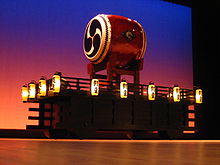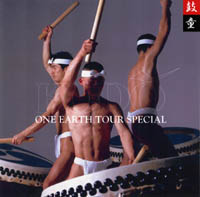Kodō (taiko group)
This article contains wording that promotes the subject in a subjective manner without imparting real information. (February 2010) |


Kodō (鼓童) is a professional taiko drumming troupe. Based on Sado Island, Japan, they have had a role in popularizing taiko drumming, both in Japan and abroad. They regularly tour Japan, Europe, and the United States.
Although the main focus of the performance is taiko drumming, other traditional Japanese musical instruments such as fue and shamisen make an appearance on stage as do traditional dance and vocal performance. Kodo's performance include pieces based on the traditional rhythms of regional Japan, pieces composed for Kodo by contemporary songwriters, and pieces written by Kodo members themselves. The numbers that Kodo perform can change from concert to concert. Kodo's performance normally lasts for about one hour and forty minutes.
In Japanese the word "Kodo" conveys two meanings: "heartbeat" the primal source of all rhythm and, read in a different way, the word can mean "children of the drum," a reflection of Kodo's desire to play their drums simply, with the heart of a child.
Kodo strives to both preserve and re-interpret traditional Japanese performing arts. From worldwide tours and research trips, Kodo brings back to Sado world music and experiences which now exert a strong influence on the group's performances and compositions. They also collaborate with other artists and composers.
Since their debut at the Berlin Festival in 1981, Kodo have given over 3,100 performances on five continents, spending about a third of the year overseas, a third touring in Japan and a third resting and preparing new material on Sado Island.
History

Kodo was formed in 1981 by former members of the taiko group Ondekoza and debuted at '81 Berlin Festival. The group spent the next 7 years touring Europe, Japan, North and South Americas and the Far East. Following this, they founded Kodo village on Sado Island, and also started Earth Celebration, an international arts festival on the island that is managed by the city of Sado and the Kodo Cultural Foundation.
In 1989, the group held its first drum workshop, referred to as Kodo Juku.
Kodo received the MIDEM Music Video (Long Form) Award at the 3rd International Visual Music Festival in Cannes in 1994, as well as the Japanese Foreign Ministry award for contributions to exports through Earth Celebration and overseas tours.
The non-profit Kodo Cultural Foundation was established in 1997, and three years later, they founded the Kodo Arts Sphere America organization in North America. This organization started to present workshop tours in 2003.
Organizations
There are three organizations that handle Kodo's activities. Kitamaesen manages everything related to the group's performance activities. Otodaiku, manages group copyrights and the development and sale of musical instruments used in Kodo's performance. Their The group's non-profit activities are organized under the Kodo Cultural Foundation.
Kodo Village
After more than a decade of living in a converted schoolhouse, Kodo finally obtained 25 acres (100,000 m2) of thickly-forested land on the Ogi peninsula in the southern part of Sado Island, and in 1988 the opening ceremony of the village was held. In keeping with Kodo's dedication to preserving traditional arts, the first structure, the main office building, was reassembled from the timbers of a 200 year-old farmhouse that was scheduled for demolition. It has now been extended and includes communal cooking and dining areas as well as a library devoted to world music and dance. Since then, a reception building (also a reassembled farmhouse), a dormitory building, a studio and most recently a new rehearsal hall have been added. In addition to these main communal buildings, married members of the group have been building family homes on surrounding land.
Members
There are currently 48 members of Kodo, including 24 performing members (17 men, 7 women) and 24 staff members. The performers range in age from 22 to 58 years old. Apprentices and part-time workers included, the total number of people who are part of the Kodo extended family rises to about seventy people.
Apprentices who hope to be players (there are also apprentices who hope to become staff members) spend two years living together communally in what was once an abandoned schoolhouse. After this period, apprentices who have been selected to become junior members spend one more year training and practicing in the hope that at the end of the year they will be chosen to become part of the Kodo organization.
In the past, the group lived communally as a whole. This is still true of the younger members who live together in the Kodo village, but senior members now live outside the village in nearby communities.
Performing members
As of Jan 2010:
|
|
|
Staff
As of Jan 2010:
|
|
|
Discography
| Date | English | Japanese | Notes |
|---|---|---|---|
| 1988 | Ubu-Suna | 産土 (うぶすな) | |
| 1989 | Blessing of the Earth | ||
| 1990 | Irodori | 彩 | Gold Disc Award for Japanese classical music |
| 1991 | Gathering | ||
| 1991 | Mono-Prism | モノプリズム | |
| 1992 | Kaiki | 回帰 | |
| 1993 | Best of Kodo | ||
| 1994 | Nasca Fantasy | ナスカ幻想 | with Isao Tomita |
| 1995 | The Hunted | ハンテッド | original motion picture soundtrack |
| 1995 | Kodo Live at the Acropolis | 鼓童~アクロポリス・ライブ~ | |
| 1996 | Ibuki | いぶき | |
| 1998 | Against | ||
| 1999 | Sai-Sō: The Remix Project | 再創 | |
| 1999 | Ibuki Remix | 再創~“いぶき”・リミックス・アルバム | |
| 1999 | warabe | 童 | |
| 1999 | tsutsumi | 鼓 | |
| 2000 | Tataku: The Best of Kodo II (1994–1999) | ||
| 2001 | Mondo Head | モンド・ヘッド | |
| 2002 | FIFA 2002 World Cup Official Anthem | ||
| 2003 | Hero | soundtrack | |
| 2004 | Sadoe – One Earth Tour Special | 佐渡へ~鼓童ワン・アース・ツアー スペシャル~ | |
| 2005 | prism rhythm | ||
| 2011 | Akatsuki |
DVD
- Kodo, 2000. Documentary profiles of 4 players shot during the 1998-99 "One Earth" tour.
- Kodo: Live at the Acropolis. VHS 1997, DVD 2002
- Kodo: One Earth Tour Special. (c) 2004, recorded 20-21 November 2003 at Setagaya Public Theater, Tokyo. Directed by Tamasaburo Bando.
